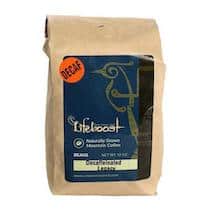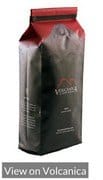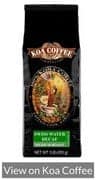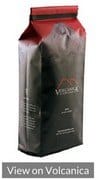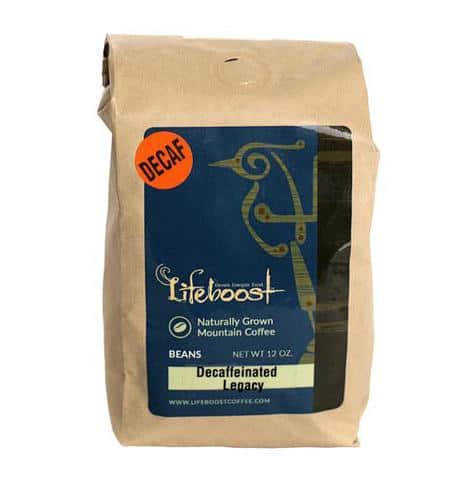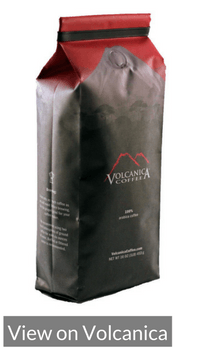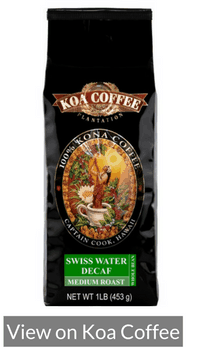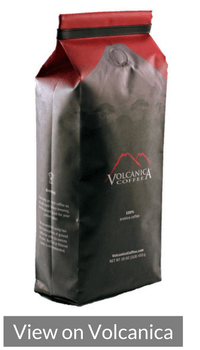10 Best Decaf Coffee Brands in 2025
Nothing compares to the bold, satisfying taste of a cup of coffee, but many people have trouble enjoying it because of all the caffeine.
The alternative is decaffeinated coffee, which provides the delicious goodness without so much of the caffeine that can cause jitters and other problems.
Just as it is with regular brew, not all caffeine free coffee is created equally and some brands stand above the crowd due to their superior taste.
If you’re looking for good decaf coffee, here are some great picks.
Top 10: Best Decaf Coffee Brands
Lifeboost’s Decaf Coffee, Organic & Mountain Shade Grown
The newest contender for best Decaf Coffee is Lifeboost’s Decaf Single origin, Mountain shade grown, hand picked, spring water washed, sun dried Certified Organic coffee.
The beans are Swiss Water Processed, which is one of the safest and chemical free ways to decaffeinate coffee.
The mountains of Nicaragua is where only the highest varieties of Arábica and Maragogipe bean are grown. Pesticides are not used.
The ripening process is slow, to guarantee the final product has all the organo-leptic properties of a world-class coffee. It’s unique washing, sun drying, and humidity process, combined with a “rest” period for the beans, are only a few of the “secrets” to this.
So how does it taste?
It’s a rich and bold coffee with undertones of chocolate and caramel with a slight fruitiness, some even say slightly sweet. It has an intense and delicious aroma that is very unique, and is a cup that has very low acidity, making it easy on the stomach and teeth.
The downside is that with excellent quality comes expense and Lifeboost is one of the more expensive brands on the market.
In my opinion, the health benefits and taste is worth it.
They are also running a promotion currently where you can save 30-40% on your first orders. Go here to take advantage of that
Cafe Don Pablo Decaf Colombian Gourmet Coffee

Cafe Don Pablo is one of the best tasting decaf coffee varieties made from Colombian Supremo beans.
In addition to using high quality Colombian Supremo, Cafe Don Pablo is decaffeinated using an all natural Swiss water method.
This amazing coffee has natural notes of cocoa and caramel with a hint of citrus.
This smooth blend is perfect for any time of day, and makes an especially delicious coffee to serve with desserts or pastries.
NO FUN JO: Organic Decaf Coffee, Swiss Water Process

No Fun Jo Decaf contains 100% Arabica coffee beans for a bold taste that’s round and smooth.
This is a great decaf coffee to choose if you’re looking for a variety that’s organic and free of GMOs. It’s decaffeinated using the Swiss water process, fairtrade certified, and has a medium dark roast that’s rich, robust, and indistinguishable from the best regular coffees.
No flavorings are added to this blend, but none are needed because the taste is excellent.
This is also a good option if you’re looking for a coffee that’s very low in acid.
Fresh Roasted Coffee Sumatra Decaf – Fair Trade

Fresh Roasted Coffee makes superb varieties, and one of the best decaf coffee blends that they offer is an organic decaf made from Sumatra beans.
It’s mountain water processed, which is an all natural method comparable to the Swiss water process, and comes in whole bean and ground form.
Great care is taken to ensure that the processing of the beans is environmentally friendly, including the roasting process. This particular variety is medium roasted, with gives it great body and a taste that will satisfy any coffee lover.
It is fair trade certified! No additives, flavoring, or preservatives are included, allowing you to fully experience all of this coffee’s flavor notes.
Volcanica Coffee Costa Rica Decaf Tarrazu
An excellent decaf coffee that’s made from single origin beans is Volcanica Coffee’s Costa Rica Decaf. It’s made via Swiss water processing and is 99.9% free of caffeine.
The coffee’s taste perfectly represents the best of its region from the maintains of San Jose, and its medium roast helps bring out the flavor notes without lending any bitterness.
A notable difference between this brand of decaf and others is its exceptionally smooth and clean taste, which comes through no matter how you brew it.
Another great thing about this coffee is you can order it in several forms, including whole beans, drip, French press, and espresso grind.
Kicking Horse Coffee Decaf

If you’re a fan of dark roasted coffee, you know how rare it is to come across a decaf variety that has a truly rich and deep flavor.
Kicking Horse Coffee’s decaf dark roast is one of the best varieties that’s not only dark roasted but made using the Swiss water process. The beans in this blend are sourced from South and Central America, and it’s certified fairtrade, kosher, and organic.
This is the perfect coffee for those who adore the taste of dark roast blends, but also want to avoid taking in too much caffeine.
Koffee Kult Colombian Decaf

Koffee Kult is well known for the outstanding flavor of its regular coffees, but it also makes several great decaffeinated blends as well.
One of the best tasting decaf coffee varieties from Koffee Kult is the Colombian decaf, which has an amazing aroma. This is one aspect that some decaf coffees fall short on, but you won’t be disappointed with the fragrance coming from this one as it brews.
The Colombian beans used provide a full bodied brew, and Swiss water processing ensures no chemicals are added to the finished beans.
This is a medium roast that’s definitely on the bold side of the spectrum.
Koa Coffee Decaf Kona
Koa Coffee produces incredible blends from Hawaiian coffee beans, including their decaf Kona.
The blend is medium roasted to retain the distinct characteristics that make Kona beans such a favorite among coffee lovers. Swiss water processing is used to allow the flavor of the beans to shine.
This is the coffee that many who have been disappointed with other brands of decaf turn to, as it’s delicious and you truly can’t tell the difference between it and regular coffee.
It’s wonderful anytime of day, but it works especially well as an after dinner treat.
Eight O’Clock – The Original Decaf

High quality decaf coffee can definitely get expensive, but if you want an affordable option consider Eight O’Clock’s decaf variety.
It’s comprised of 100% Arabica beans, which have a smoother flavor than blends containing robusta. A medium roast is enough to provide satisfying richness and deep flavor, but this coffee isn’t bitter at all.
The beans are certified Kosher, and this is a good pick for those who want a great tasting coffee with an enticing aroma.
If you’re a fan of Eight O’Clock’s Original regular coffee, you’ll also enjoy the decaf version.
Stone Street Coffee Mayan Decaf

Stone Street makes a truly special blend that’s one of the best decaf coffee varieties to choose if you not only want excellent favor but prefer to buy sustainable beans.
This is one of only a handful of coffees to be certified by the Rain Forest Alliance, and it’s also Swiss water processed to maintain its chemical free composition.
The coffee’s taste is remarkable, with a very smooth flavor, richness from medium roasting, and little acidity.
The beans in this variety are responsibly sourced from Central America, and each batch is micro-roasted for outstanding quality.
Volcanica Coffee Sumatra Mandheling Decaf
Those who enjoy trying different single origin coffees will definitely want to check out this one from Volcanica Coffee.
Sumatra Mandheling is a rare variety from Indonesia that has an earthy flavor, supreme richness, and substantial body unlike anything else. Best of all, it’s available in decaf that’s been Swiss water processed to preserve its unique flavor notes and character.
It’s medium roasted to order, which ensures that you don’t get any beans that are stale or lacking flavor.
This is the type of decaf that you can easily enjoy without adding any cream or sugar anytime of day, and it’s a particularly tasty treat at breakfast.
What is Decaf Coffee?
Decaf is coffee that has undergone a process to remove most of the caffeine in it. No decaf coffee is 100% free of caffeine, but it contains at least 97% less caffeine than regular beans. Other than the fact that its caffeine has been largely removed, decaf is used to brew coffee the same way that regular beans are.
Years ago it used to be that decaf had a distinctly different taste from regular coffee that was a bit flat and off, but since the caffeine extraction processes have improved so has the quality of decaf varieties.
Now you can find easily find the best decaf coffees that taste identical to their caffeine loaded counterparts.
Decaf is not the same as coffee alternatives, such as yerba mate, licorice tea, chicory, or carob. Drinks made from those ingredients contain no coffee at all, but decaf is all coffee, just without the normal amount of caffeine.
Those who find they don’t tolerate any amount of caffeine well at all should still avoid decaf.
Benefits of Decaf Coffee
While some people drink coffee because they want the jolt of energy and prefer it for perking up and staying awake, others can suffer effects ranging from shaking to excessive sweating or headaches from taking in too much caffeine.
This is where the benefits of drinking decaf come in, as it allows you to enjoy the taste of a cup of coffee without any of those issues.
Here are some other advantages of drinking decaffeinated coffee:
Decaf Processes
There are four primary ways that coffee is decaffeinated:
With indirect and direct-solvent processes, chemicals are used to remove caffeine from coffee beans. Ethyl acetate and methylene chloride are the typical agents used to complete the decaffeination.
The carbon dioxide process is similar to indirect and direct-solvent processes, but it uses carbon dioxide in place of the chemicals. After the coffee beans are soaked in water, they’re placed in a tank where carbon dioxide is forced into the beans, which draws out and dissolves much of the caffeine.
A chemical free way to decaffeinate coffee is the Swiss water process, which has been around since the 1930s and uses osmosis to get rid of caffeine.
Whole coffee beans are soaked in hot water, which helps the process of dissolving the caffeine get started. The water that’s drained off the beans then passes through a charcoal filter, which is able to capture the molecules of caffeine while releasing the smaller flavor and oil molecules that lend coffee its signature taste.
The flavored water is then used to soak other batches of coffee, which are packaged and sold once the process is finished.
Though the USDA states that decaf has to be at least 97% caffeine free, the Swiss water method is able to get rid of up to 99.9% of caffeine in coffee beans.
It’s also the method most widely used for organic decaf due to its absence of chemicals.
How Much Caffeine is in Decaf Coffee?
It’s true that there is still come caffeine in decaf, but it’s not nearly as much as regular coffee. The amount of caffeine in decaf coffee depends on how large a serving you have and the way that it was processed.
In general, an eight ounce serving of brewed decaf contains between 2 and 12 milligrams of caffeine, which is a stark contrast to the 95 to 200 milligrams of caffeine in a serving of regular brewed coffee.
